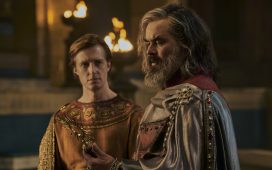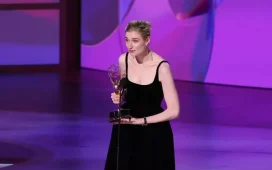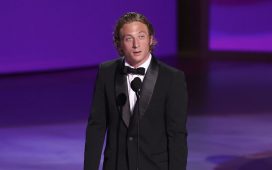Daemon’s Cruelty
At his best, Daemon Targaryen is a charming, incredibly complex man who is ambitious, brave, and loyal. But he’s also capable of incredible darkness—from his frequent selfishness and casual violence toward women to his penchant for murder. He holds grudges, schemes constantly, and repeatedly makes chaotic plays for power, even against the very people claims to support. He’s certainly not the worst Targaryen in this regard (Maegor the Cruel says hello!) and a lot of his ugliest traits are at least somewhat balanced out by the fact that he genuinely seems to love both Rhaenyra and his children, but when Daemon decides to unleash his worst self, it’s a lot. (See also: The Blood and Cheese incident.)
His six times great-grandaughter is similarly capable of great cruelty when she feels it’s justified. Daenerys’ worst deed is the burning of Kings Landing, likely killing tens of thousands of innocent people in her quest to sack and punish the city, but that’s hardly the first time her anger got the best of her. She takes a sadistic joy in Khal Drogo’s murder of her (admittedly, abusive) brother by dumping molten gold over his face. She gleefully burns the witch Mirri Maz Duur and crucifies over 150 random Meereenese aristocrats in retaliation for the (again, admittedly, horrific) actions of the city’s leaders. She feeds people—some likely innocent—to Rhaegal and Viserion in response to the Sons of the Harpy attack. But Dany believes herself to be the rightful queen of Westeros, and in that is justified in crushing her enemies. By whatever means necessary.
Rhaenyra’s Care for the Smallfolk
Throughout most of House of the Dragon’s run thus far Rhaenyra Targaryen has been resistant to full-on war. There are many reasons for this: choosing sides will literally tear her family apart, unleashing the dragons to maim and kill one another (as well as anyone standing in their way) is a generally bad idea, and her awareness of the bigger concerns that revolve around Aegon’s Song of Ice and Fire prophecy means that she knows this is a conflict with potentially generational stakes attached. That she does her best to prevent fighting and minimize collateral damage, even after her own son is brutally murdered by Aemond (Ewan Mitchell) and Vhaegar is a credit to her, and stems from a genuine care for the realm and all the people in it.
Rhaenyra has always had a special affection for the smallfolk of Westeros. Known as the Realm’s Delight as a child, she was generally liked by the common people and seen as the rightful heir to the throne. Her desperation to prevent thousands of pointless deaths is driven in large part by the fact that she knows that in a war between dragons, it is the people with the least who will undoubtedly suffer the most. Her half-brother Aegon, in contrast, favors more tyrannical policies of heavy taxation and deprivation, meaning that the smallfolk of Kings Landing often had to struggle to find food while watching processions of provisions meant to feed the king’s dragons pass them by. Was Rhaenyra’s decision to send food into Kings Landing politically motivated? Of course, but it also helped keep her people fed.
Similarly, Daenerys has a unique rapport with the smallfolk of both Westeros and Essos. She sees them as those who are most oppressed by the ruling elite and vows to “break the wheel” that keeps them all in chains (whether literal or figurative). She has seen the suffering of the common folk up close and it has made her empathetic to their plight, a belief which is reflected in her actions from killing slave masters and freeing their captives to chaining up her own dragons when one of them eats a local farmer. Dany fights to free slaves and feed the impoverished, so it’s not hard to see why the smallfolk would love her for that. And it’s ultimately what makes her decision to kill so many innocents in Kings Landing even more horrifying than it would have been otherwise.
A Trio of Literal Dragons
In, “The Burning Mill,” the third episode of House of the Dragon’s second season, Rhaenyra sends her step-daughter, Rhaena (Phoebe Campbell) to escort her youngest children off of Dragonstone to safety. They’re meant to journey first to the Vale and Lady Jeyne Arryn’s (Amanda Collins) keep before hopefully continuing on across the Narrow Sea to Pentos. But in addition to Rhaenyra’s young sons Aegon and Viserys and their fledgling dragons Veraxes and Stormcould, Rhaena is also carrying a different type of special cargo: four dragon eggs.














